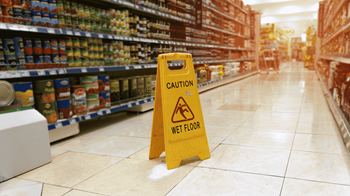<p>By: Tom Cosgrove, Director, Industry Relations, FMI<br /></p><p><img src="https://www.fmi.org/images/default-source/blog-images/wet-floor-sign-grocery-store.tmb-large-350-.png?Culture=en&sfvrsn=62f17a82_1" style="margin:10px;float:right;" class="-align-right" alt="wet floor sign grocery store" sf-size="539746" />Imagine it’s a Friday afternoon in late July — peak season for backyard BBQs, pool parties and beach vacations. You’re walking the floor of one of your busiest stores when you spot it: a teenager nervously circling the seafood case, eyes darting toward the lobster tails. Moments later, they slide a package into their oversized hoodie and bolt for the exit. Fortunately, your trained staff is already in motion — calmly engaging them at the door and recovering the merchandise without incident.<br /></p><p>That’s summer in grocery retail. High traffic, high temperatures — and high stakes for asset protection.<br /></p><p>Summer transforms the grocery landscape. Families stock up for picnics, tourists flood coastal towns and holiday weekends drive surges in alcohol, protein and high-dollar seasonal items. These trends aren’t lost on opportunistic shoplifters and organized retail crime rings. Items like steaks, seafood, premium liquor and OTC medicines become easy, portable targets.<br /></p><p>At the same time, self-checkout lanes hum with activity. While these systems offer efficiency, they also open new avenues for theft — intentional or accidental — if proper monitoring isn’t in place. There are countless examples where quick intervention and well-placed associates at self-checkout prevent hundreds of dollars in shrink.<br /></p><p>Summer also brings increased liability risks. Condensation from AC systems, spilled drinks from frozen slushies and slippery entryways from sudden thunderstorms can all lead to slip-and-fall incidents. And parking lots — where hot engines, distracted pedestrians and summer tempers collide — can become flashpoints for customer disputes or vehicle incidents.<br /></p><p>The key lesson is simple: preparation is protection. Seasonal staff need clear training on theft deterrence and safety protocols. A simple first step could be simply greeting the guest in question and asking if they need help. Simply letting them know that staff are around can act as a first line of defense and is also providing great customer service! It is also important to note that technology — from video analytics to temperature monitoring — must work in concert with human judgment.<br /></p><p>Summer may be a season of opportunity for our customers, but for asset protection, it’s a season of vigilance. And when done right, it’s also a chance to strengthen your teams, fine-tune your systems, and safeguard what matters most.<br /></p><p>You are not alone in this endeavor. FMI has many resources available to help you and your colleagues. I encourage you to check out FMI’s <a href="https://www.fmi.org/industry-topics/asset-protection">Asset Protection Resources</a> and consider attending our 2026 <a href="https://www.fmi.org/asset-protection-and-grocery-resilience-conference">Asset Protection & Grocery Resilience</a> conference. Finally, depending on your role, I encourage you to consider joining FMI’s Asset Protection Council and/or FMI’s Risk and Safety Council. Both councils host monthly calls and annual summits to ensure that we as an industry are properly prepared for what’s currently happening, and what’s to come in the years ahead. Feel free to reach out to me or Doug Baker for more information.<br /></p><p><a href="mailto:tcosgrove@fmi.org" class="button" target="_blank">EMAIL ME FOR MORE DETAILS</a><span style="background-color:initial;font-family:inherit;font-size:inherit;text-align:inherit;text-transform:inherit;word-spacing:normal;caret-color:auto;white-space:inherit;"></span></p>
[#item_full_content]




